

UNWTO anonymous online chat room created
WorldTourismWire received an enormous feedback and many questions were raised in regards to UNWTO, the Secretariat and of course the new Secretary General Election.
Some questions WorldTourismWire readers had originated from members of an anonymous online chat room created with no other interest than the welfare of UNWTO. This is according to the moderator of this chat-room. He called UNWTO an organization guided on the outside but now shoddy and rusted inside.
When this group was started, Ideas were exchanged and debated. Eye-opening facts were revealed. Questions were raised by the announcement of the health condition of the UNWTO Secretary-General last year.
When explaining it further the chat room moderate said: “This is the voice of an anonymous group of UNWTO stakeholders, where no one knows who is who after over a year of activity. Detached from any particular influence, the Group wants only to safeguard the Organisation from the ever increasing drift of its Secretariat into politicization, misadministration, and mismanagement.’
The moderator went on to say:” In recent years UNWTO seems to have become an organization at the service of its Secretariat (Secretary-General and a small entourage). An apparatus of cheap propaganda focused on promoting the image of its Secretary-General while claiming to defend lofty ideals of global sustainable tourism. Our goal is to put the Secretariat, thus the Organization, back on track. We believe that one way of doing so could be by airing some questions that may raise the awareness of UNWTO and staff members alike.”
“The aim is not to do any harm. At the contrary, it is to protect the important achievements of this Secretary-General from reckless micro-management and abuse of authority.”
Here is a sample of two questions:
1)Why did the Director of such an important department as the Programme of Statistics resign? More importantly, why was he summarily dismissed after he resigned and just a few days before his resignation entered into effect? Why was the Executive Council not informed?
2) Why did the Legal Counsel of the Organization quit after many years of loyal service? What ethical issues over what questions triggered his resignation.To make it clear WorldTourismWire and this author
To make it clear WorldTourismWire and this author have no part in this chatroom, and we’re not planning to join the chat but are willing to listen. We may sometines relate relevant questions to UNWTO spokespersons or WorldTourismWire readers for a response or clarification.
WorldTourismWire asked the two sample questions and received this response from UNWTO:
Although all questions raised have their due clarifications, UNWTO will not make any public comments on these as they relate to either subjects of personal nature (issues of UNWTO Staff Members) which are legally protected by confidentially regulations and principles or issues which have been discussed in their rightful place by UNWTO Member States, i.e. the UNWTO statutory meetings in due time (the report of the UN Joint Inspection Unit mentioned was presented and discussed at the UNWTO 98th Executive Council as shown by the public link to the UNWTO web page, the same way that the Executive Council was informed of the changes in the UNWTO Statistics Programme).
More to come on WorldTourismWire.
Many more questions have been asked about the Internal Governance chapter (click here)
You may wish to take a look at the Internal Governance chapter in the link above. You may find interesting, inter alia, how top-heavy the Secretariat is in comparison with sister UN agencies. The references to how salaries of Executive Directors have been paid may be of interest according to members of the chatroom.
The forum moderator wondered how many UNWTO members studied the report of the UN inspectors a few years ago.
WorldToursmWire is always interested in your feedback:
Click here to submit your thoughts.
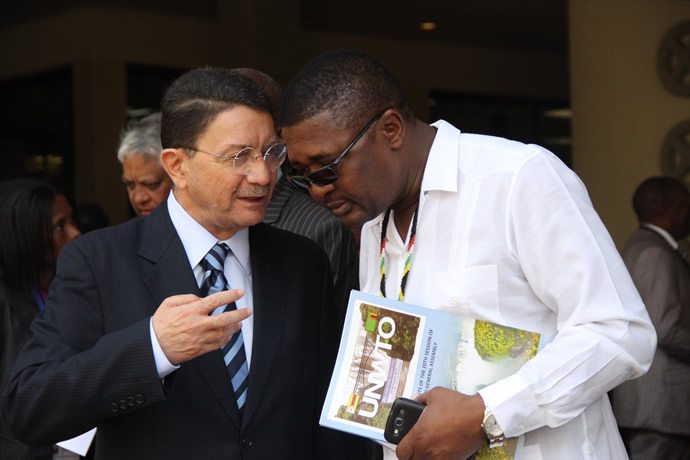
General Assembly: UNWTO responded to Mzembi
UNWTO responded to Zimbabwe’s request to add an agenda point to the in September upcoming UNWTO General Assembly debate in Chengdu, China.
The minister did not release a copy of the response but told WorldTourismWire the issue was with his legal team. He added: “I am sure we will prevail.”
The next UNWTO General Assembly is set for September to be held in Chengdu, China. The Minister for Tourism and Hospitality from Zimbabwe, Dr .Walter Mzembi had requested an agenda point added to the agenda to discuss the May 12 recommendation by the UNWTO Executive Council for the new Secretary General. The minister broke the silence about his concern on June 13 (click here) .
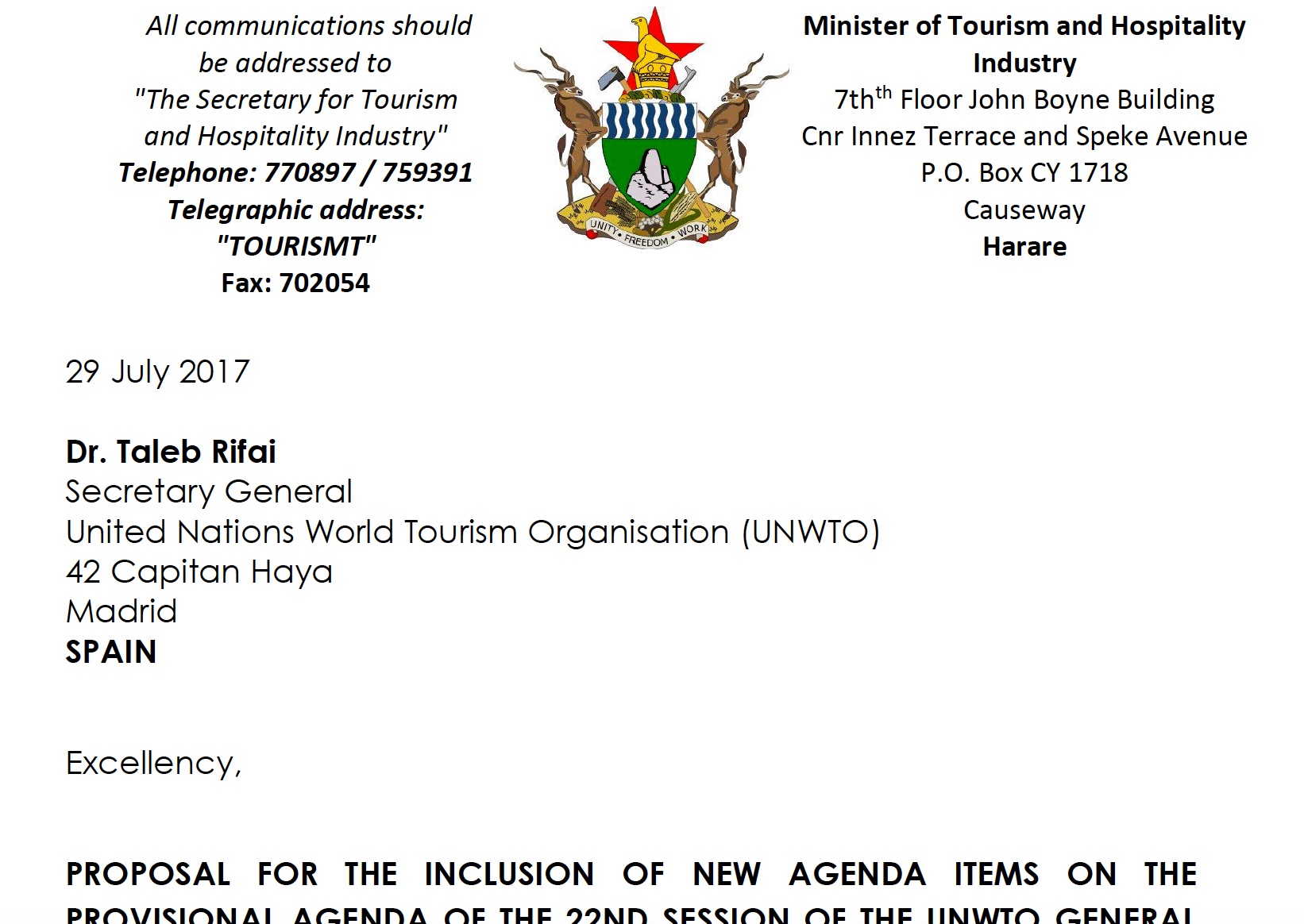
Walter Mzembi to Taleb Rifai: Respond and provide videos on Madrid election proceedings
The fight to confirm or not confirm the nominee for UNWTO Secretary General Zurab Pololikashvili from Georgia is shaping up.
There was no response or acknowledgment yet by the Secretariat of the United Nations World Tourism Organization (UNWTO) after the Hon. Walter Mzembi, Minister of Tourism and Hospitality for ZImbabwe on July 18 sent an official letter to the current Secretary General Dr. Taleb Rifai. This letter was copied to all UNWTO members.
The Zimbabwe minister who was also a candidate for the highest post in UNWTO and tidily lost against the candidate from Georgia requested for Agenda items to be included at the 22nd UNWTO General Assembly 2017 (click to download a PDF) in Chengdu, China (11-16 September 2017)
Today Dr. Mzembi sent a reminder also copied to all UNWTO members to Dr. Taleb Rifai urging him to react. In addition in his reminder, Mzembi is asking for a full video footage of the electoral process held on 12 May 2017 during the Executive council meeting in Madrid.
This reminder and request for a response and videos said.
TRANSCRIPT:
“I refer to my letter dated the 18th of July 2017 (herewith attached) seeking your indulgence to include the following agenda items to be discussed during the 22nd UNWTO General Assembly from 11 – 16 September 2017:
Agenda 9: Election of the Secretary General of the Organisation.
a) Discussion of the UNWTO Executive Council Elections of Secretary General (2018-2021), held in Madrid, Spain, 12 May 2017.
b) Discussion of the UNWTO Rules of Procedure on the conduct of elections.
c) Appointment of the Secretary General for the period 2018-2021 on the recommendation of the Executive Council (Original Agenda Item 9 becomes 9c).
Esteemed Secretary General, to date, I have not received acknowledgment of receipt of my communication by your esteemed Office. I am very concerned that no response has come from your Office.
I wish to urge your good Office to revert to me as soon as is possible regarding the request to add Agenda items to be a discussion at the 22nd UNWTO General Assembly to be held in Chengdu, the People’s Republic of China.
For the avoidance of doubt, I attach the same copy. Excellency, Secretary General, I further humbly request a full video footage of the electoral process held on the 12th of May 2017 at the Melia Castilla, Madrid, Spain from your office.
I need the video in order to have a comprehensive appreciation of what transpired inside the room during the elections. Please send me the video footage directly to me in time as my delegation prepares for the 22nd General Assembly.
I wish to state my country’s total commitment to the UNWTO – the organisation that we all look up to in terms of leading global tourism and providing Member States, Affiliates and Associations with the desired strategic leadership for the transformation of global tourism for the betterment of all in the world.
Once again, Excellency, Secretary General, I thank you for your understanding and consideration of the foregoing request, and I would also ask that you accept the assurances of my highest consideration.
Hon Dr. Walter Mzembi (M.P.)
MINISTER OF TOURISM AND HOSPITALITY INDUSTRY
REPUBLIC OF ZIMBABWE
UNWTO REGIONAL COMMISSION FOR AFRICA (CAF) CHAIR
Mzembi: It’s not too late to fix this and it’s not about me…
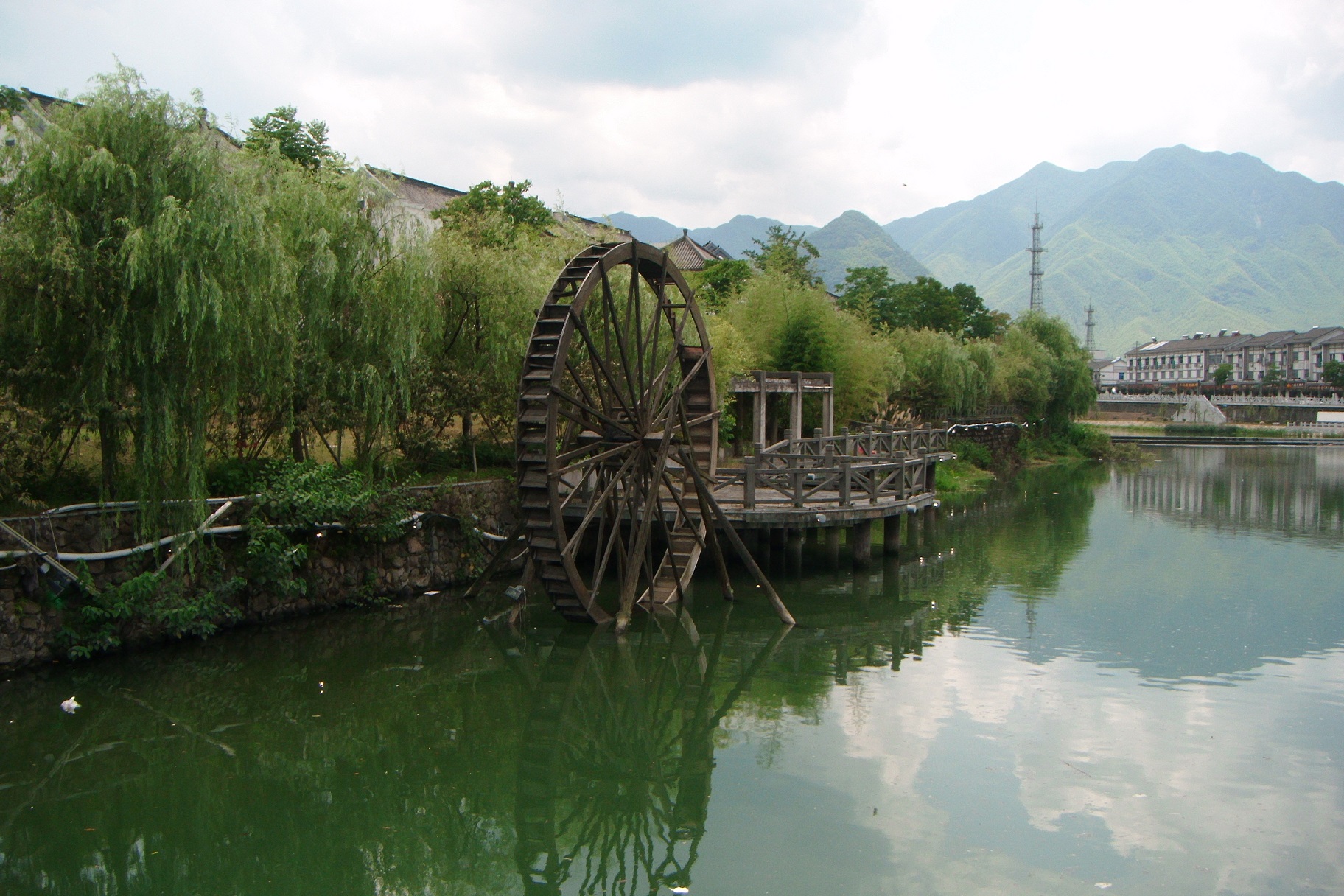
Rural Tourism: Sharing the Countryside
(Huzhou, China) – Interest in Asia Pacific rural tourism has spiked in recent decades, much like country
retreats did in 19 th -century Victorian England, and for similar reasons. The growing urban Asian
population is seeking to escape their pressure-filled, yet often mundane city life, and are increasingly
turning to leisure and relaxation holidays in the countryside.
However, the Asia Pacific faces a much different situation today than Thomas Cook in the 1850s. To
explore this organically rising phenomenon, Huzhou City, China, partnered with the Pacific Asia Travel
Association (PATA) and World Tourism Organization (UNWTO) to host The Second International Rural
Tourism Conference from 16-18 July 2017, in Anji County.
During the opening ceremony, PATA Chief Operating Officer Dale Lawrence presented the International
Rural Tourism Destination Base Award to Anji County Magistrate Chen Yonghua. Huzhou and the Anji
region are known for forested hills, bamboo varieties, white tea, rivers and reservoirs, pandas, and
calligraphy.
PATA Foundation Chairman Peter Semone then launched the UNWTO publication, “Report on
International Rural Tourism Development: An Asia Pacific Perspective”. The 200-page document
presents case studies on 14 rural tourism destinations in the Asia Pacific, including Huzhou.
Mr Semone, the report’s lead writer and editor in chief, said, “As 2017 is the International Year of
Sustainable Tourism for Development, we wanted this publication to focus on best practices and
successful strategies in Asia Pacific rural tourism development.”
Shen Mingqua, Secretary of the Anji County Tourism Committee, then welcomed the 300-plus delegates
from more than 15 countries to “The Home of Asia Pacific Rural Tourism”. Mr Mingqua presented Anji’s
achievements including the first certified rural tourism destination and the only recipient of the UN Habitat
Award.
“Innovation is key to our success…We are like a model for rural tourism ideas,” Mr Mingqua said, noting
that Anji is now trying to lure the MICE crowd. “We want businesses visiting here for meetings to stay and
see where their products come from and how they are made.” The tourism committee is also targeting
families for agricultural experiences.
Dr Ong Hong Peng discussed rural tourism products and pointed out that potential offerings crossed all
sectors. “The range of products is very diverse and can include almost everything,” the former Secretary
General of the Malaysia Ministry of Tourism and Culture stated. He presented a “six-part rural tourism
house” with rooms for affordable luxury, natural adventures, niche segments, festivals and events, MICE,
and culture and heritage.
Dr Peng then brought accommodation and lifestyle into the mix. “Homestays are important for rural
tourism, but they must be more vibrant…innovative…to add value…It can be in all ranges of
accommodation, as some people want privacy.” He suggested a “hybrid of a village stay and homestay”.
Airbnb China Vice President An Li stepped in with an alternative for rural tourism accommodation. “Airbnb
is ‘all for one’ tourism in a share economy. Distribution is better than hotels, and more hosts can
participate,” she said, adding, “Airbnb-ers stay twice as long as those in traditional accommodation. They
tend to be bigger spenders, and want good accommodation.” Mrs Li noted that spin-off employment from
Airbnb goes to local women, young people, and the elderly.
China’s Naked Retreats presents luxury in nature alongside memorable rural experiences that positively
impact communities. “Shanghai is crowded and smoggy, and people want to holiday outside the city,”
said Tolga Unan, the resort chain’s general manager. “We employ and work with the locals and learn
from them and about their lifestyle. Our aim is to preserve and complement, and not change.”
Conference Moderator and CCTV Host Bai Yansong injected that rural tourism is not just about the
countryside. “Urban areas are changing to become more rural-like, by embracing a green environment…It
is not just urban to rural…it’s a two-way street that connects and shares.”
The conference then shifted to a panel discussion on “Sharing the Countryside”, which carried over from
the keynote presentations. UNWTO Executive Secretary for the Asia Pacific, Xu Jing, observed that the
region is a latecomer to rural tourism, and it must adjust the old model to meet the new economic climate.
“The experience needs to be authentic. The setting may be the community, but the actual home is the
actual setting.”
Mr Jing added, “Visitors want to do what locals do, and they want to integrate their urban lifestyle with
rural aspects…Rural life is a dream for urbanites. They forgot what it’s like…listening to the sounds of
nature and seeing the stars.” He noted that rural people, who migrated to the city, often visit their
hometowns and even retire there.
Dr Liu Feng, Chief Advisor for the Beijing Davost Group, went further, stating, “City dwellers are envious
of those who visit or move back to rural areas.” He also picked up on Mr Yansong’s idea of “reverse
development”, noticing the growth in rural-type cities. “Rural is nostalgic, and people want to revitalize
traditional life,” he said. “They connect rural tourism with urban life. It’s more personal, community-like,
and simple.”
The discussion moved back to the countryside, as PATA Vice Chairman Chris Bottrill brought up
cooperation versus competition or “co-opetition”. “Having both improves the product,” he said, pointing to
authenticity of experiences and differentiation. “We should share approaches and what we learn within
and between countries.” As for challenges facing rural tourism development, Mr Bottrill said that when
working with rural communities, you need time, trust, and respect…“It’s not just ‘UNESCO’ that attracts
visitors.”
UNWTO Expert Committee Member Madam Xu Fan suggested “world heritage” have a more personal
touch, and looked to the next generation to create new innovative ideas. Regarding the pace of
development, she said, “Rural tourism is like planting and harvesting crops. It needs ongoing care, and
the focus must be on the farmer-tourist relationship and not just money for farmers. Rural tourism is about
rural lifestyle and not its components.”
UNWTO Senior Researcher Omar Nawaz also cautioned against fast development, as it affects quality.
“Planning is one thing, but implementation takes time. You need a long-term concept…a relationship
between rural and general tourism,” he said, and suggested learning from other’s mistakes. “Listen and
learn. Adapt to new demand. Focus on inclusive development, and develop from slow to fast. The
challenge for rural tourism is in developing too fast.”
Mr Semone compared rural tourism development in Europe to the Asia Pacific. “European rural tourism
has been continually developing for more than 100 years, during a period of large middle-class growth.
The Asia Pacific has only been on line for 20 to 30 years, but this presents an opportunity for a new Asian
initiative,” Mr Semone said. “Learn lessons from Europe, but make development unique to Asia.”
Mr Semone noted his belief that Asians are reluctant to innovate even though there are plenty of creative
people. “Asians tend to copy rather than try something different. They need a more Asian-centric
development model. Too often, Asian countries get caught up in the copycat stage, such as Laos. Let’s
do something different.”
Mr Semone also discussed the “Report on International Rural Tourism Development: An Asia Pacific
Perspective”. “This report aims to showcase the power that rural tourism has to help people escape
poverty, improve their livelihoods, and slow urban migration.”
The report defines “rural tourism” as a “distinct element of both sustainable and responsible tourism.”
Criteria include a rural location and activities that remain rural in scale, traditional in character, growing
slowly and organically, and connected with small-scale enterprises and local families.
Rural tourism may include niche tourism segments such as ecotourism, agro-tourism, and geo-tourism.
“Rural tourism is not a simple and easily identifiable market segment,” Mr Semone said.
Each of the report’s 14 case studies has a different theme, as the situations of their destinations vary.
However, all analyze policy and planning, product development, marketing and promotion, and social and
economic impacts. A closing discussion investigates key challenges, opportunities, and lessons learned.
“The case studies demonstrate that with the right circumstances and conditions, rural tourism can create
new sources of income at both the community and household levels,” Mr Semone said.
He stressed the necessity for a new type of PPP – people-public- private partnerships – in which all
stakeholders are represented. “This is a new concept that challenges the status quo of competitive
jealousies in favor of collective benefit.”
The report concludes that rural tourism destinations need to create responsible and sustainable business
plans and proactive marketing strategies that account for their specific situations. Mr Semone summed
up, “There are different paths to the same goal.”
Today, you’d be hard pressed to find a rural tourism package on Thomas Cook’s website, but more
foreign visitors are seeking an experiential holiday in secondary Asian destinations, and rural tourism
offers them another avenue for a responsible and authentic countryside stay.
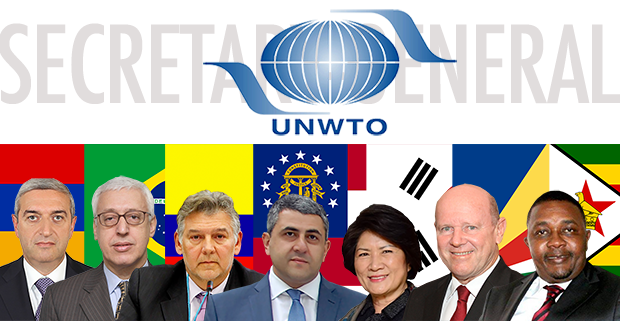
Mzembi: It’s not too late to fix this and it’s not about me…
Last week the Hon. Walter Mzembi, Chair of the UNWTO Regional Commission for Africa (CAF) and serving Zimbabwe as the minister of Tourism and Hospitality proposed to add items to the agenda of the UNWTO General Assembly and to discuss the UNWTO Secretary General selection and appointment. The next UNWTO General Assembly is set for September to be held in Chengdu, China.
Numerous feedback WorldTourismWire received from competent sources and members of the inner UNWTO circle stated that Mzembi’s request can be good and useful, but adding those items to the agenda should not be taken for granted. Some say one should expect loads of stalling and procrastination to ultimately kill this initiative.
In the meantime, Dr. Walter Mzembi wants to put those at ease that may think this initiative is only about Mzembi’s ambition to become the next UNWTO Secretary General. He told WorldTourismWire: “Contrary to a line running in sections of our UNWTO Secretariat which wants to reduce genuine calls for reform of an archaic electoral system to a personal fight between me and Zurab and a bigoted campaign against Zimbabwe, I hold no animosity against or towards anyone including the current Secretary General, whom I still consider a friend. ”
“But genuine friendship seeks to protect the other’s legacy by advising the rightly. And legacy is also written by leaving the organization in competent and safe hands, and that is a function of sound statutes and rules of procedure. As part of the team that has governed with the current Secretary General uninterrupted for nearly a decade, we can easily suffer a collective indictment of failing to be succeeded competently. So not so much about Ambassador Zurab Pololikashvili who benefited from an opaque process but us who failed to tighten procedures, and I am saying it’s not too late to fix this by advising rightly and professionally.”
Emotions apparently are high: Another concerned senior tourism Executive within UNWTO unrelated to Zimbabwe or Africa made it even more clear in telling WorldTourismWire: “The proposal submitted by Zimbabwe seems to be a step in the right direction, that of holding the Secretariat to account. I hope more members will follow Zimbabwe´s example by demanding explanations not only to unsound policy but also to many reckless, unethical and abusive managerial practices that are putting the future of the Organization at risk. The Secretariat is crying out for a true internal management audit.”
“The Secretary General must not arrive at the General Assembly feeling immune to make deals, with total impunity, with the most influential members of the Organization at the expense of the future of the institution.”
“It is not about attacking him or anyone. It is about exposing the true nature of the situation we are in now. Instead of leaving behind a sound Secretariat at the service of global tourism and its stakeholders, a wretched exhausted Secretariat – with demoralized staff – is about to be handed to incompetent hands that risk throwing the entire Organization over a cliff. There are people around who care, who are watching and who see beyond this curtain of propaganda. “
WorldTourismWire reached out to UNWTO on Zimbabwe’s intervention but has not yet received a response. Apparently, Dr. Rifai was traveling in Congo at the time of our request after a two-day return left for Africa again.

Tourism Development and Conservation: Challenges and Opportunities
The Zimbabwe Minister of Tourism & Hospitality Industry, Hon. Dr. Walter Mzembi spoke on the occasion of the Parliamentary Conservation Caucus Launch on “Tourism Development and Conservation: Challenges and Opportunities on July 19 at the Meikles Hotel, Harare:
Transcript:
Tourism worldwide is in the export category. It ranks third, behind only fuel and chemicals, and ahead of food products and automotive industry. In many developing countries such as Rwanda, tourism is the top export sector. It contributes 10% to Global GDP, generates 1.5 trillion USD in export earnings, employs 1 in every 11 globally, accounts for 30% of total exports in services and it is 7% in quantum for all global trade. The sector has experienced exponential growth from 25 Million international arrivals in 1950 to 1.2 Billion international arrivals in 2016.
Africa experienced a tremendous growth of 8.1% from 53.8 million in 2015 to 58.2 million in 2016. Global growth has been sustained since 2009. However Africa’s market share has remained very small at an average 3-5% in the past decade.
Going forward to 2030 aligned to the SDGs timelines, the sector is signposting 1.8 Billion. However, we are likely to revise these figures on the back of fast growth of the Chinese outbound tourism market. The Chinese Premier last year cautioned us to prepare to receive 600 million Chinese tourists by 2020 from the initial projected growth of 280 million. China is the current bulwark of outbound tourism with its ever growing middle class of over 300 million. What it means is that Africa should prepare itself to receive the world.
Coming closer home, in the year 2016, Zimbabwe received a total of 2 167 686 tourist arrivals, 5% up from 2 056 588 received in 2015. Tourism contributes plus or minus 10 percent to GDP, coming second to Mining and Agriculture. It has potential to grow above the current 5% growth rate in arrivals if adequate resources are directed towards its development. Zimbabwe tourism is mainly nature based and therefore its success mainly depends on biodiversity – Flora and Fauna endowments. This calls for sustainable utilisation and management of our biodiversity and nature in general.
In its 2015 Study Report ‘Towards Measuring the Economic Value of Wildlife Watching Tourism in Africa’ by the UNWTO which followed the presentation of our concept note on ‘Tourism and Biodiversity: Zero Tolerance to Poaching in Africa by 2020’, the UNWTO identified nature related activities constituted over 80% of what Africa sells to markets as its major attraction in its product offering. Set against the scourge of biodiversity terrorism which in our parlance we call poaching, countries and the international community have the responsibility of protecting nature. Tourism is the cutting business edge of biodiversity in its marine and terrestrial nature, and without it, we cannot be there.
It is important to note that there has been a seismic shift specifically from consumptive to non – consumptive forms of wildlife tourism which offer visitors the experience of observing wildlife in natural and non – captive habitats. Generally, species of wildlife that can be observed through this form of tourism are the same as those most threatened by poaching and other forms of environmental detriments. We are at a point here in Africa where some countries have run short of particular wildlife species such as elephant and the rhino due to poaching – the reason why we need to move towards more and more enforced conservation, restoration and rejuvenation of our biodiversity. The biggest mischief is in the source markets that provide incentives for illegal dealing in wildlife products, and our concept alluded to above speak to those issues.
Poaching remains the in my view, remain the biggest scar in the conscience of humanity, and threatens tourism development considering that wildlife is the backbone of the tourism industry. We have aptly named it biodiversity terrorism. In 2013 over 100 elephants were killed through cyanide poisoning in Hwange National Park. More animals of different species have been at the mercy of poaching threatening the survival of the tourism industry. This has been fueled by lack of adequate resources and poor coordination among transfrontier countries in fighting poaching. Government ceased with the matter and putting measures to ensure that we provide adequate protection of our wildlife with full support of international cooperating partners. I hasten to say, we are happy that Parliament is active in this area in terms of legislation, advocacy to ensure that environmental crimes are punished severely to curb the rampant poaching.
Forests which are a major component of scenic tourism have been facing major deforestation. The trees are mainly used as a source of energy in areas where there is no electricity. Resettled farmers who do not have the proper equipment and resources for drying their tobacco have become a major threat to the forests as they use wood as a source of energy for drying their tobacco. The trees are also used as a source of timber for construction work and for making furniture. Nyanga is one tourist resort which is fast losing its appeal to tourists due to deforestation. There replacement rate for the trees that are cut down currently stands below zero, meaning no efforts are being made to replace these wild lands. Wild fires are a sight in most provinces during the dry season. This has greatly affected our flora and fauna. Animal habitat have been affected and it has destroyed many forests and grasslands. It is imperative for government to move in quickly through crafting of new legislation that provides stiffer penalties and provide resources for implementation if ever we are going to protect our country from becoming a desert.
Pertinent to the issue of wildlife is human-wildlife conflicts which is not only a problem in Zimbabwe but Africa wide. It occurs in many countries where human and wildlife ecologically intersect in the ecosystem, and they have competing requirements overlaps. These are particularly common near protected areas and nature reserves where adjacent communities suffer crop raiding and predation on their livestock. In many cases, losses go without compensation because in the last two decades, the CAMPFIRE Association has been unable to provide the required compensation due to sanctions that crippled the once highly supported organisation. We are appealing therefore to partners to come on board and ensure that this institution is resources and enabled to execute its mandate and restore its yester – year glory. Wildlife do not know about the political differences we have as people, but they also deserve co-exist with us, thus, anything that hurts this relationship must be addressed, hence my call to those who imposed sanctions on us and our wildlife to rethink about the matter.
In the same perspective, it is important to intensify to develop more sustainable tourism products that links communities with nature. To this end, there is need to develop and implement integrated community conservation projects such as Conservancies across the country.
As a Ministry, we have set ourselves targets to achieve a $5 billion dollar tourism economy backed by 5 million arrivals, contributing to 15% to GDP by 2020 – which we call 5; 5; 15; 2020. This is possible. Tourism is a low hanging fruit, which requires support and robust marketing and promotion of our destination underpinned by our unparalleled biodiversity.
We are also diversifying our products to include culture, heritage and historical tourism and indeed, city tourism as city brands are emerging as key destinations. Within their configurations, there is always a component of nature and this is the reason why we are promoting the concept of city – parks. A visit to Harare without going to Mbizi Game Park and the Lion and Cheater Park or Lake Chivero will not be enough. Going into the future, modelled around our successful land reform programme, we envisage integration of plots and farms to initiate conservation projects as lucrative enterprise. This has already started with some newly resettled farmers in Marondera having begun such projects. We encourage this innovation and creativity, which we want to see growing in Zimbabwe as we pursue conservation farming as a matter of policy objective.
We would want to see more marketing of our products. Destinations that are fast becoming successful tourism economies have invested more in promotion and incentivizing both domestic and international visitors. Tanzania for example in 2014 set aside $5 million budget for marketing alone. In Zimbabwe, the sector received not in excess of 4 million in budgetary allocation for both all operations of both the Ministry and the Zimbabwe Tourism Authority. Being one of the top three revenue earners within Zimasset and one key drivers of economic development, we are regrettably in the bottom 3 on budgetary allocations in the last 5 Years. I hope Parliamentarians will help us to advocate more allocation to the sector.
We have initiated the development of a National Tourism Masterplan which will direct all tourism development in the country, including depicting investable opportunities in Zimbabwe. The document also provides 3 growth scenarios which are Low, Medium and High Growth Areas in tourism. Government through its Special Purpose Investment arm, the Mosi Oa Tunya Development Company Private Limited, is ready to tango with investors in the establishments of various tourism assets and products. There is so much potential in Zimbabwe, including partnerships in wildlife conservation projects that we can do between us and the Department of Parks and Wildlife Management in the Ministry of Environment, Water and Climate – the custodians of our biodiversity.
In concluding my remarks to this important gathering, let me once again state clearly that in less than ten years, 150 thousand elephants have been lost to poaching. More than two rhinos are killed every day – a true story of the Tragedy of the Commons, and our Common Future may not exciting without these beautiful animals living side by side with us. Whether it is on the land or in the sea, few creatures are safe from harm, and behind all this bleak outlook, there are stories of human tragedy, too. The rangers are killed whilst protecting animals targeted by poachers. The villages are torn apart by poaching – we certainly have to do something as a collective. The international community that didn’t do enough here in Zimbabwe to capacitate us, should come not to the table and assist us to stop wildlife carnage. We are committed as government and let us build a powerful coalition of committed partners, who together, are greater than the sum total of those seeking to reverse the gains of conservation for tourism to thrive.
I thank you.
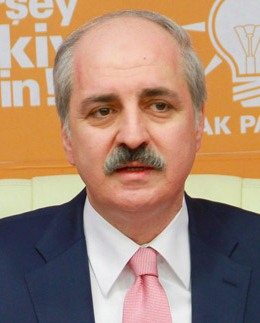
Turkey has a new tourism minister after parliament reshuffle
The Hon. Numan Kurtulmuş is now the new minister of tourism in Turkey. Tourism is one of the most important foreign exchange earners in Turkey. Turkish controversial president Erdogan decided to fire the previous minister Prof. Dr. Nabi Avci and do a more sympathetic replacement.
This was reported by the Turkish newspaper Hürriyet today.
Kurtulmus thanked Avci for his services and pledged to continue important task for the better of the travel and tourism development in Turkey. He left details open.
Kurtulmuş was born in Ünye district of Ordu Province. His grandfather was a major in the Turkish army who fought in the Turkish War of Independence. He is of Georgian descent by his grandmother. Kurtulmuş is married, and is a father of three children. His wife Sevgi Kurtulmuş is an academician. He is fluent in English and his favorite football team is Fenerbahçe.
Kurtulmus received his bachelor’s and master’s degree at Istanbul University’s School of Business Administration. He had been at Cornell University as a visiting researcher, during his dissertation work at Istanbul University. Kurtulmus obtained his PhD in economics in 1992. He became Associate Professor in 1994 at Istanbul University, Faculty of Economics.
In 1998, Kurtulmuş became Istanbul provincial head of the Virtue Party (FP) and a member of the party’s General Administrative Board. Later he served as Istanbul Provincial head of Virtue Party and deputy chair.
Kurtulmuş was elected to the chair of the Felicity Party (SP) at the Third Ordinary Congress of the Party on 26 October 2008. After a rift developed with the followers of former FP leader and former Prime Minister Necmettin Erbakan, signatures of a majority of the delegates asked for renewal of the congress and the sacking of Kurtulmuş. Refusing this, the matter ended up in court, and the court ruled that party administration should be transferred from his leadership to a board of trustees. After the ruling he had to resign from his position on 1 October 2010.
On November 1, 2010, Kurtulmuş founded a new party, the People’s Voice Party (Halkın Sesi Partisi), of which he was elected leader on November 28, 2010. In September 2012, two-year-old conservative-oriented People’s Voice Party(HSP) dissolved itself and joined the ruling Justice and Development Party (AKP) with a majority of its delegates’ votes.
He last served as the Deputy PM.
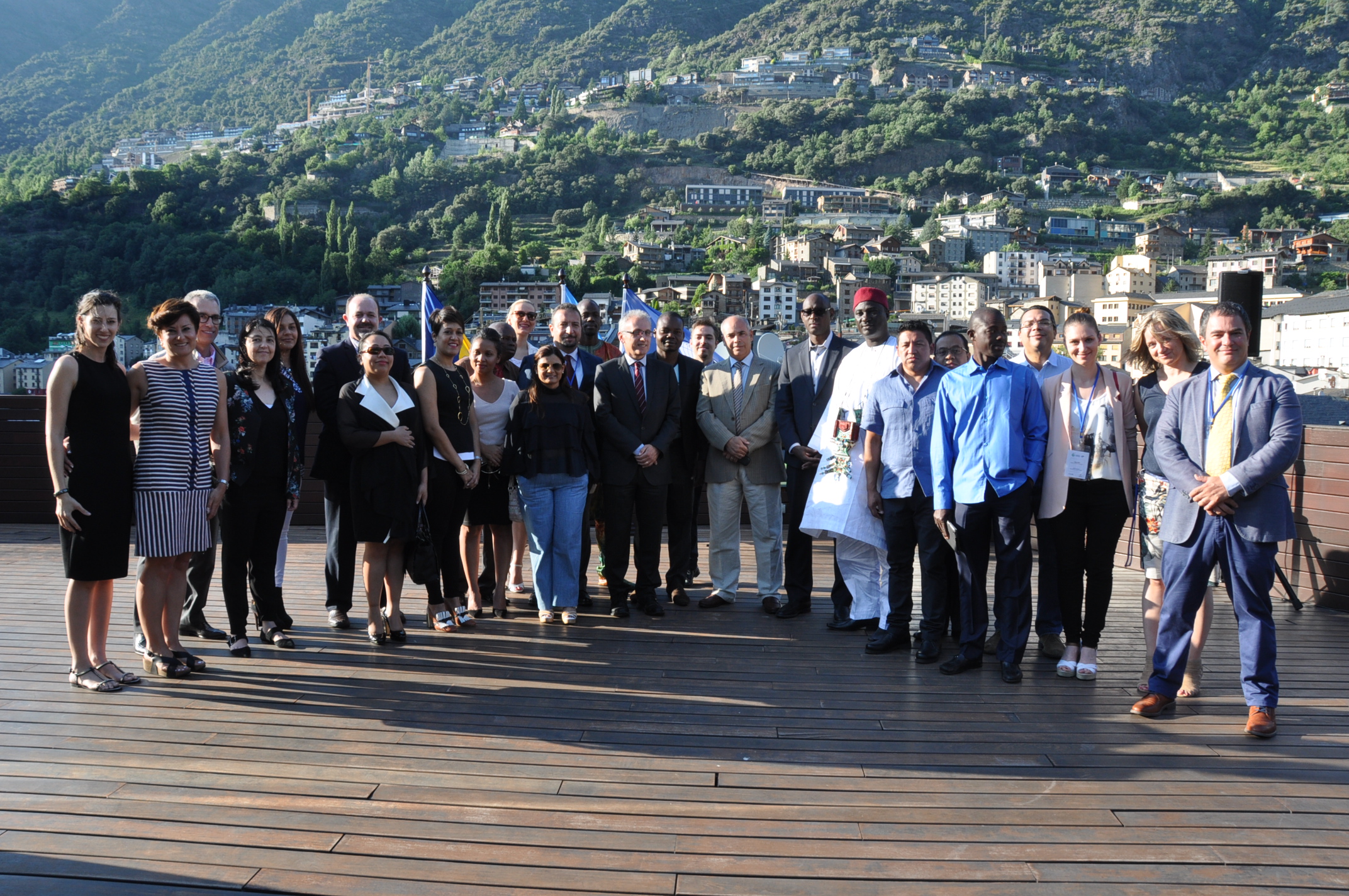
UNWTO.Themis Foundation trains 15 countries on crisis communications
Representatives from 15 Member States of the World Tourism Organization (UNWTO) took part in a three-day training course on crisis communications at the headquarters of the UNWTO.Themis Foundation in the Principality of Andorra. The training, organized by UNWTO and the UNWTO.Themis Foundation, aimed to build resilience at tourism destinations by creating capacity to develop and implement crisis communications strategies.
The Practicum on Crisis Communications included a revision of the different types of crisis that may affect tourism destinations – natural disasters, financial collapses, violent incidents or pandemics, among others – and recommended communications methodologies for each phase of a crisis – before, during and after.
The definition of protocols, the setting up of a crisis communications team, the development of communications materials and ready-to-use templates for each situation, and media relations were some of the topics included in the training.
The Practicum is an annual initiative that provides participants from Africa, the Americas and Europe with the opportunity to exchange views and experiences on various crisis situations and crisis communications cases.
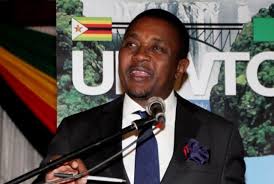
Zimbabwe wants UNWTO Secretary-General election process discussion at General Assembly in China
UNWTO Secretary General Nominee Ambassador Zurab Pololikashvili from Georgia will not be confirmed at the upcoming General Assembly of the United Nations World Tourism Organization in Chengdu, China without a fight and tough questions.
Dr. Walter Mzembi, Minister of Tourism and Hospitality from Zimbabwe made it clear today and sealed his concern and his country is requesting UNWTO to add a discussion on the election process to become a new agenda item at the upcoming UNWTO General Assembly in China.
The problem? This WorldTourismWire article by World Tourism Wire summarizes it:
http://worldtourismwire.com/unwto-election-a-second-open-letter-from-cairo-expanding-the-movement-against-zurab-pololikashvili-1577/
Mzembi told eTN today: “If I can’t convert all this lengthy deployment in tourism into a pillar of courage and oversight service to the organization at this hour when it needs most. I will not live with my conscience intact for the rest of my life. Even if I am the only one, so be it a majority of one in the service of global tourism.”
Today Zimbabwe’s minister officially wrote to UNWTO Secretary General Dr. Taleb Rifai:

PROPOSAL FOR THE INCLUSION OF NEW AGENDA ITEMS ON THE PROVISIONAL AGENDA OF THE 22ND SESSION OF THE UNWTO GENERAL ASSEMBLY; CHENGDU, PEOPLES REPUBLIC OF CHINA: 11-16 SEPTEMBER 2017.
With reference to Rule 5 of the Rules of the UNWTO General Assembly, the Agenda of a General Assembly includes “any items proposed by a Member of the Organisation.” Subsequently, the rule states that, “a member who wishes to include an item on the Agenda is required to transmit the proposal to the Secretary General at least thirty days before the opening of the session.”
In terms of the forthcoming 22nd Session of the UNWTO General Assembly to be held in Chengdu, Peoples Republic of China, from 11-16 September 2017, it is imperative that the proposed Agenda Items be submitted to the Secretary General before 11 August 2017.
It is, therefore, in this context that Zimbabwe would like to propose two new Agenda items under Agenda 9 as follows;
Agenda 9: Election of the Secretary General of the Organisation.
a) Discussion of the UNWTO Executive Council Elections of Secretary General (2018-2021), held in Madrid, Spain, 12 May 2017.
b) Discussion of the UNWTO Rules of Procedure on the conduct of elections.
c) Appointment of the Secretary General for the period 2018-2021 on the recommendation of the Executive Council (Original Agenda Item 9 becomes 9c).
In thanking you for your consideration of the foregoing request, I would also ask that you accept the assurances of my highest consideration.
Hon Dr Walter Mzembi (M.P.)
MINISTER OF TOURISM AND HOSPITALITY INDUSTRY
REPUBLIC OF ZIMBABWE
UNWTO REGIONAL COMMISSION FOR AFRICA (CAF) CHAIR
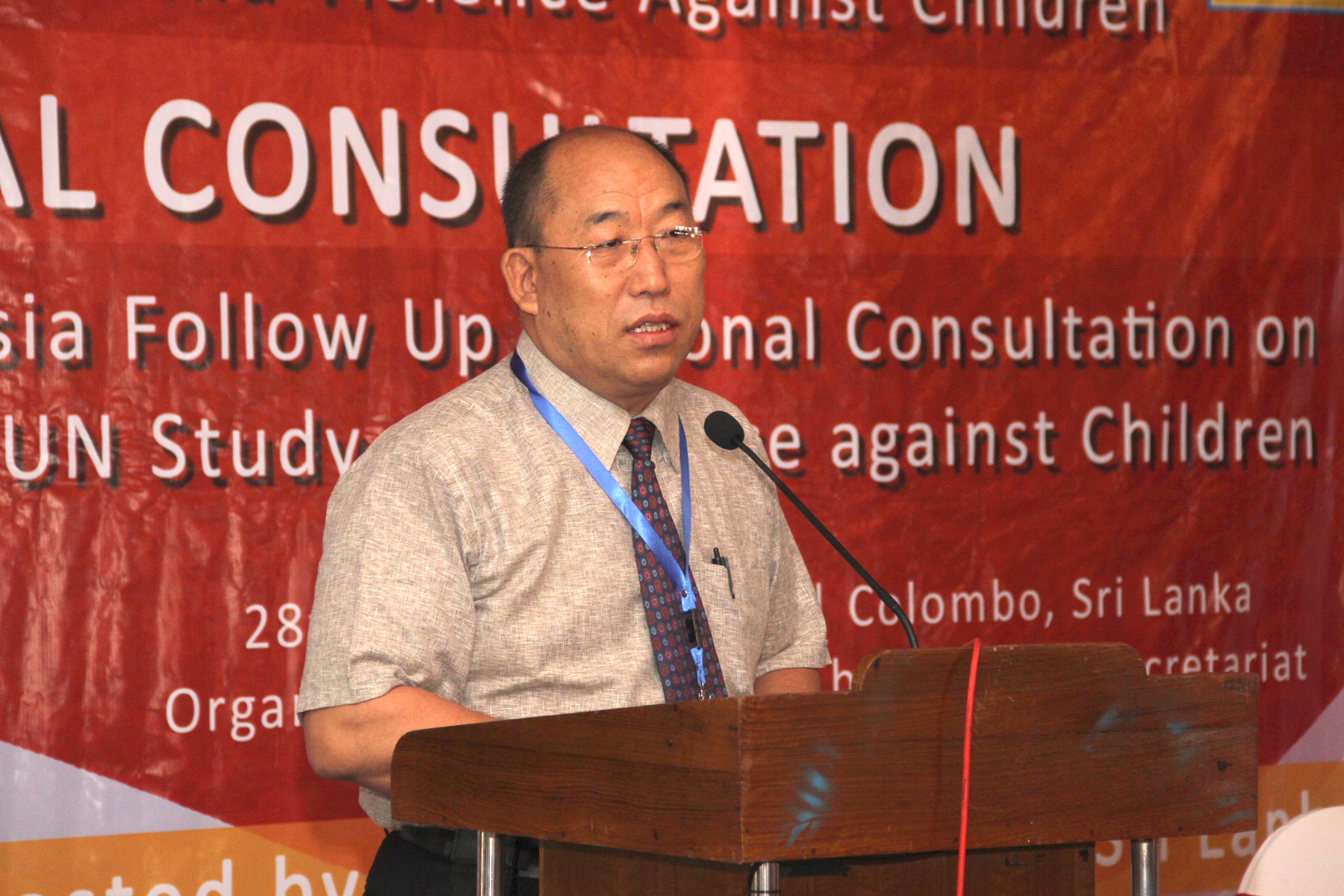
South Asia Initiative to End Violence Against Children addresses UNWTO forum
Dr. Rinchen Chophel, director general of the South Asia Initiative to End Violence Against Children (SAIEVAC) addressed the Global Study High-Level Working Group on sexual exploitation of children through tourism meeting in Madrid by VIDEO. He was unable to attend because of Spanish Schengen Visa difficulties.
Dr. Chophel said:
I convey my humble greetings to all of you who are gathered here today in our common mission to create a safer and happier world for the children of the world. It is my misfortunate that I could not make it to this important gathering despite my deepest wishes.
The South Asia Initiative to ENd Violence Against Children (SAIEVAC) is the South Asian response to the global call by the UN Secretary to End Violence Against Children. SAIEVAC is the only SAARC Apex Body for Children since the 17th. SAARC Summit in 2011 and also a member of the Global Partnership since February 2017.
SAIEVAC I believe is the only inter-governmental body in the world that has created in its governance structure an inclusive platform for children, civil society organizations, and UN/INGO partners to collectively drive the South Asian movement to end violence against children… and create a better world for children in the SAARC Region. The mandate of SAIEVAC is to employ a system-building approach to strengthen child protection across the region and address five key thematic areas (child marriage, corporal punishment, child labor, sexual abuse and exploitation of children and child trafficking) with CHild Participation, disability, and gender as cross cutting themes.
The 4th SAIEVAC Ministerial Meeting held in May 2016, hosted by the Government of India and SAIEVAC Regional Secretariat was an important milestone for SAIEVAC. The meeting took the opportunity to review the 10 Years of the Global Study, 10 years of the SAF/ SAIEVAC Journey and the 20 years of the Global Congress on CSEC. As a special consideration, ECPAT was invited as a full-fledged delegation to the meeting.
The Ministerial meeting after taking serious cognizance of the situation of CSEC in the region, among many key related decisions endorsed that.
- A regional strategy should be developed for addressing all forms of sexual abuse, exploitation (including online) and trafficking that also builds on the existing situations in the different member states, that will guide SAIEVAC while developing the second five-year plan.
- SAIEVAC should initiate a process for settings regional standards and codes of conduct that safeguard children from commercial sexual abuse and exploitation in travel and tourism
- SAEVAC regional and national mechanisms explore opportunities to mainstream and scale up efforts to address sexual exploitation and abuse of children including trafficking by tapping into potential opportunities for technical and financial support.
Between then and now, much has been made to operationalize the above decisions. Notably, among the activities undertaken, I want to highlight the following:
- Initial Draft of the Regional Strategy on CSEC and Online Safety (OS) developed in close partnership with ECPAT International, selected experts for partners in South Asia, SAARC Secretariat and the SAIEVAC Mechanisms (since July 2016)
- A regional Children’s Consultation held in December 2016 on CSEC & OS in partnership with Plan supported CSO projects and ECPAT.
- A SEIEVAC Interfaith discourse held on the draft Strategy in December 2016
- A background document on the situation of CSEC&OS in the SAARC Member states is at an advantage stage of finalization in partnership with ECPAT.
- Ongoing efforts to set up a Regional Coalition of like minded partners on CSEC & OS to support the regional efforts of SAIEVAC.
With the critical support from the Global Fund/WeProtect and ongoing collaboration with ECPAT and other key partners, SAIEVAC will be organizing the Regional Expert Group Meeting to review Regional Strategy in the 3rd of August 2017, besides a series of national level consultations in selected countries including a review of the legal and policy environment in the region.
With the complementary ongoing effots from ECPAT Internationa and its network partners as well in different countries, I have every reason to feel confident that we will make a significant difference in the coming years.
However, SAIEVAC will need to raise additional resources to sustain this momentum and further energize the next (5th) ministerial meeting in terms of greater political convergence and ownership on CSEC & OS.
